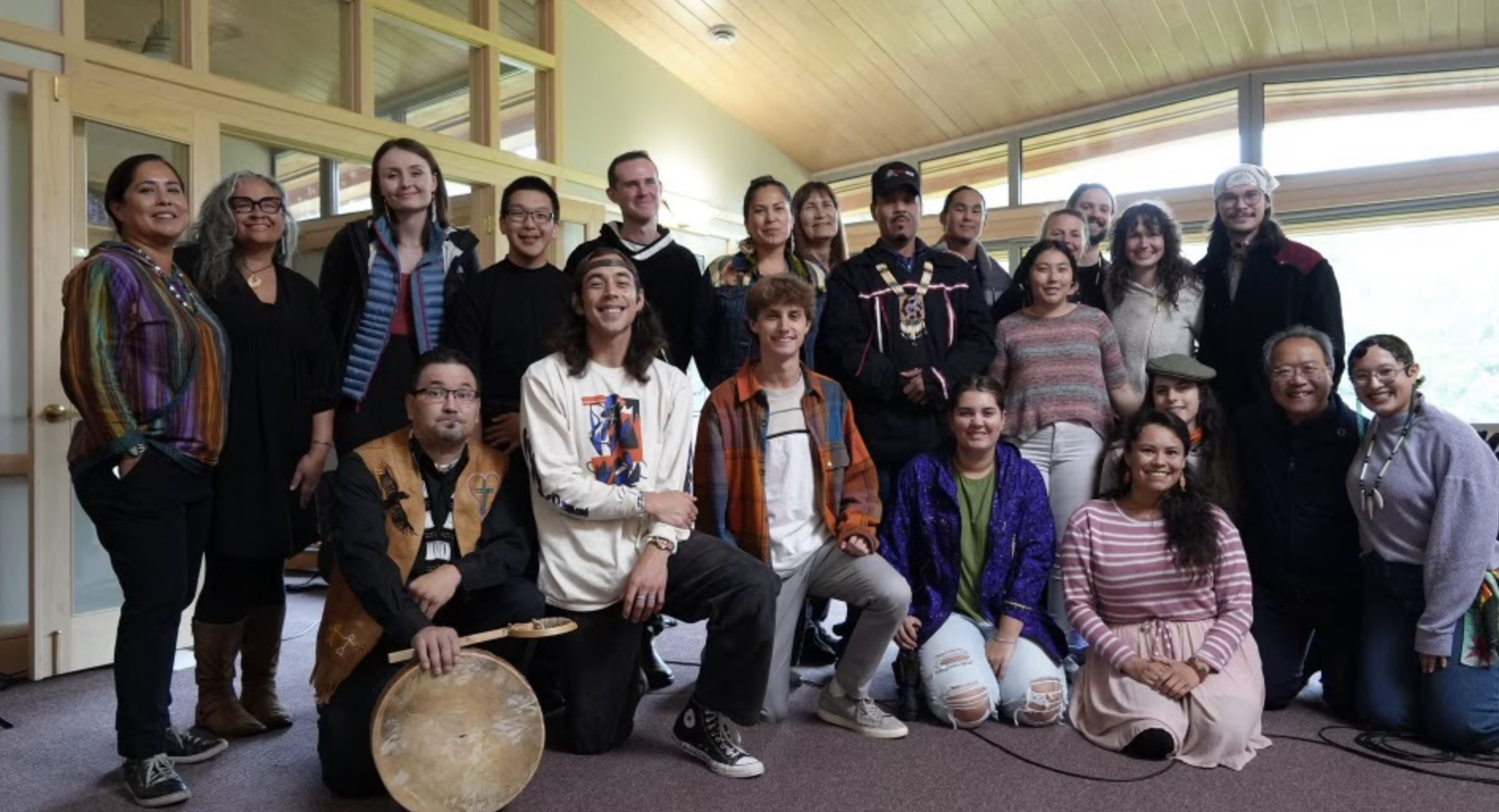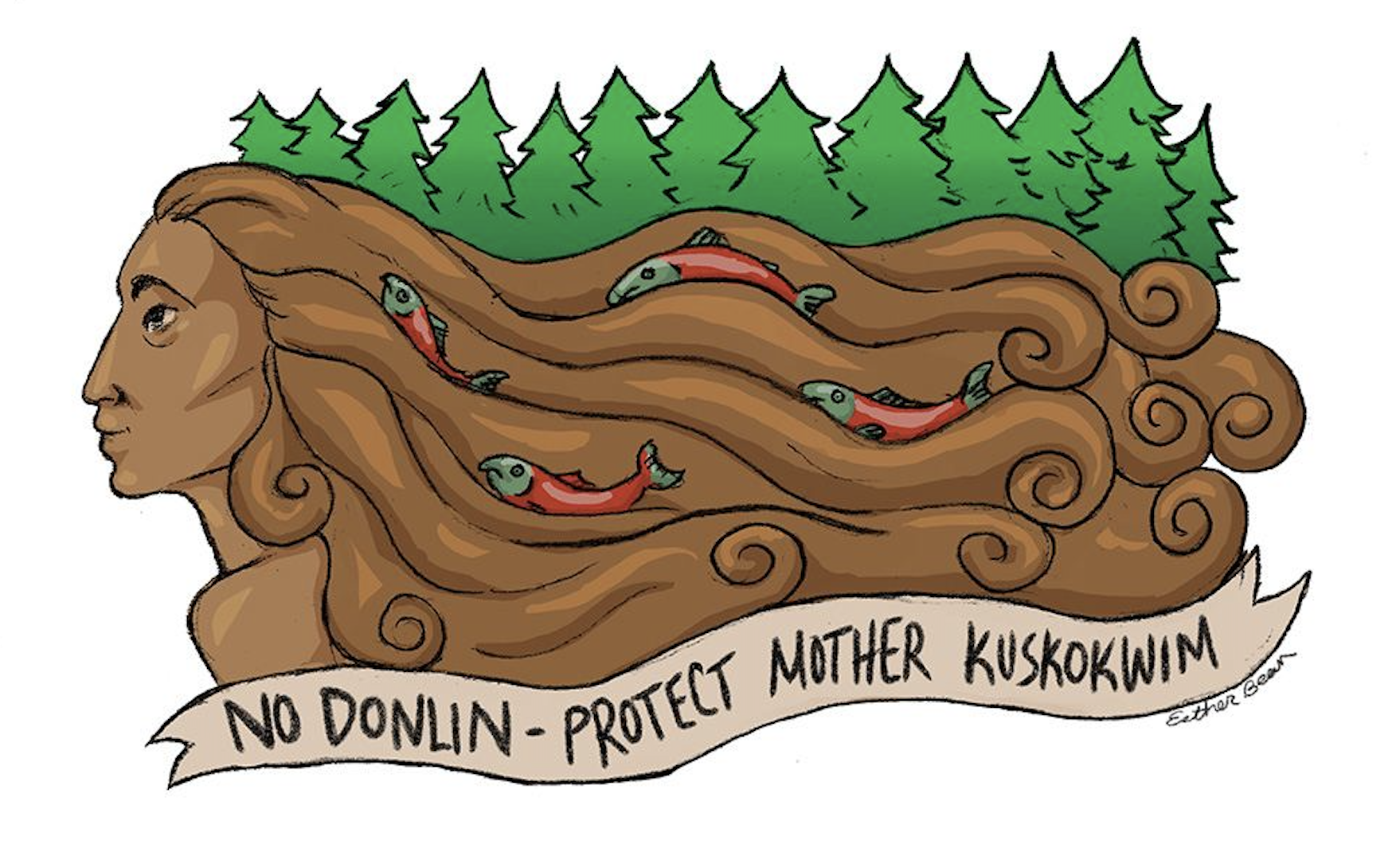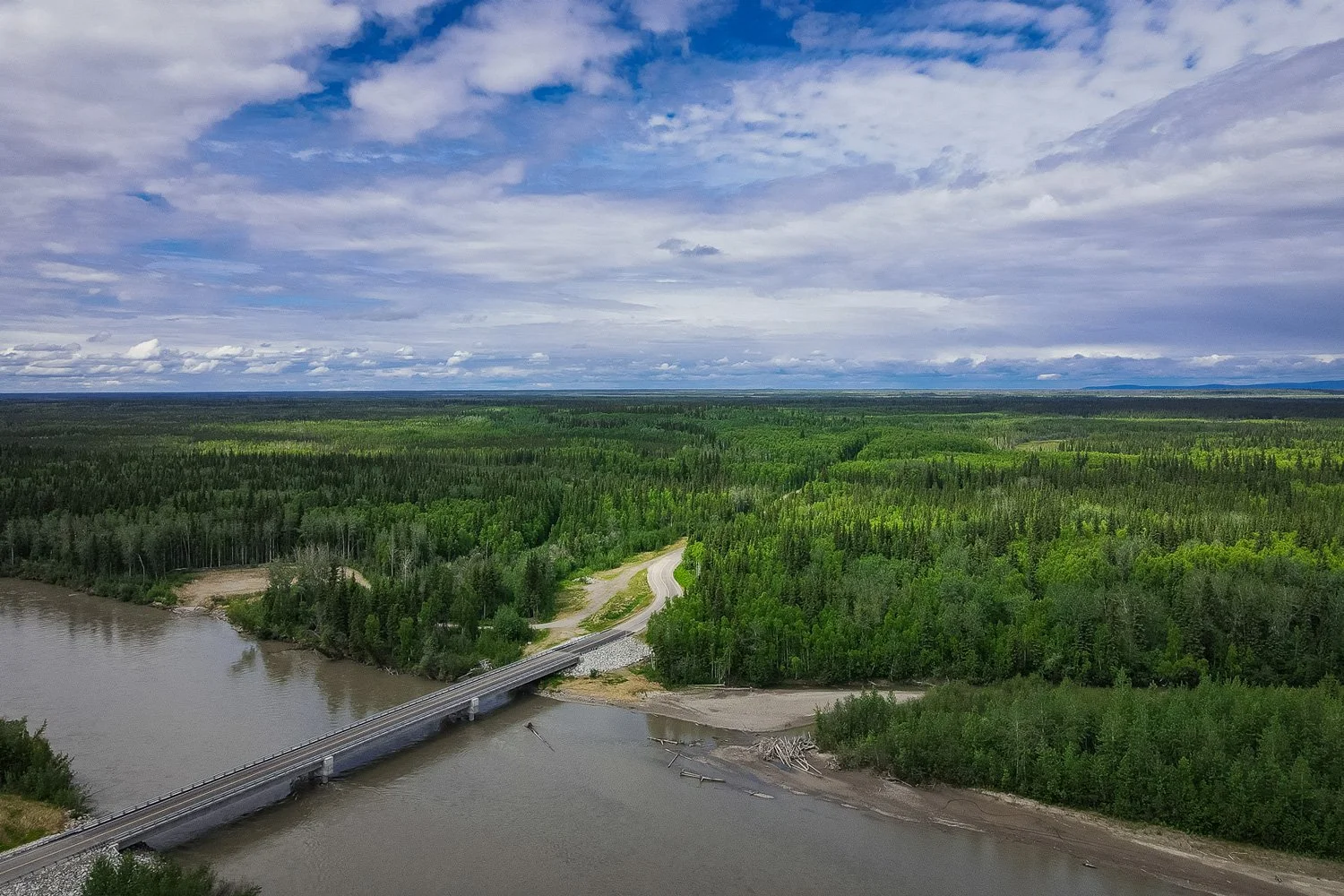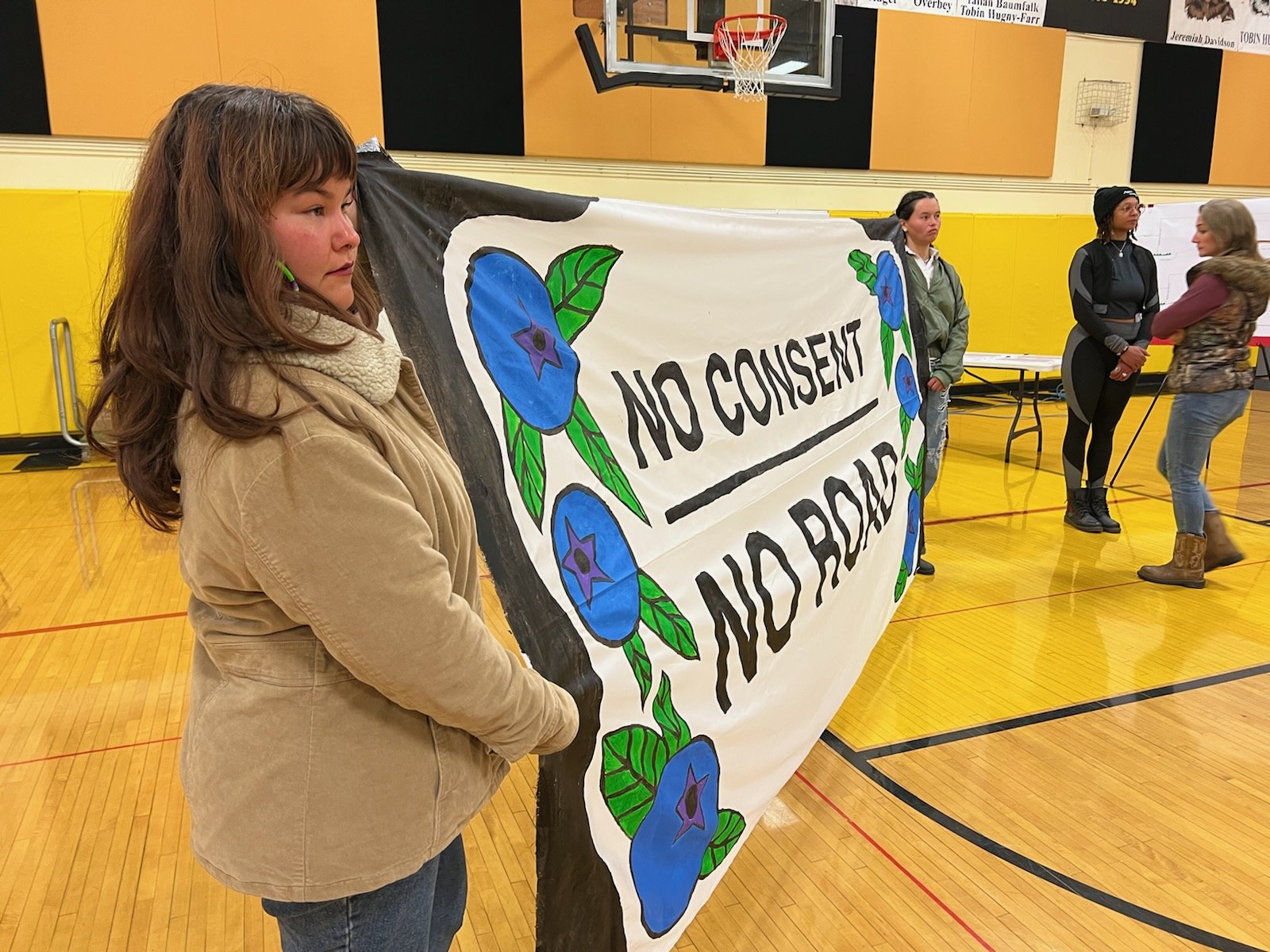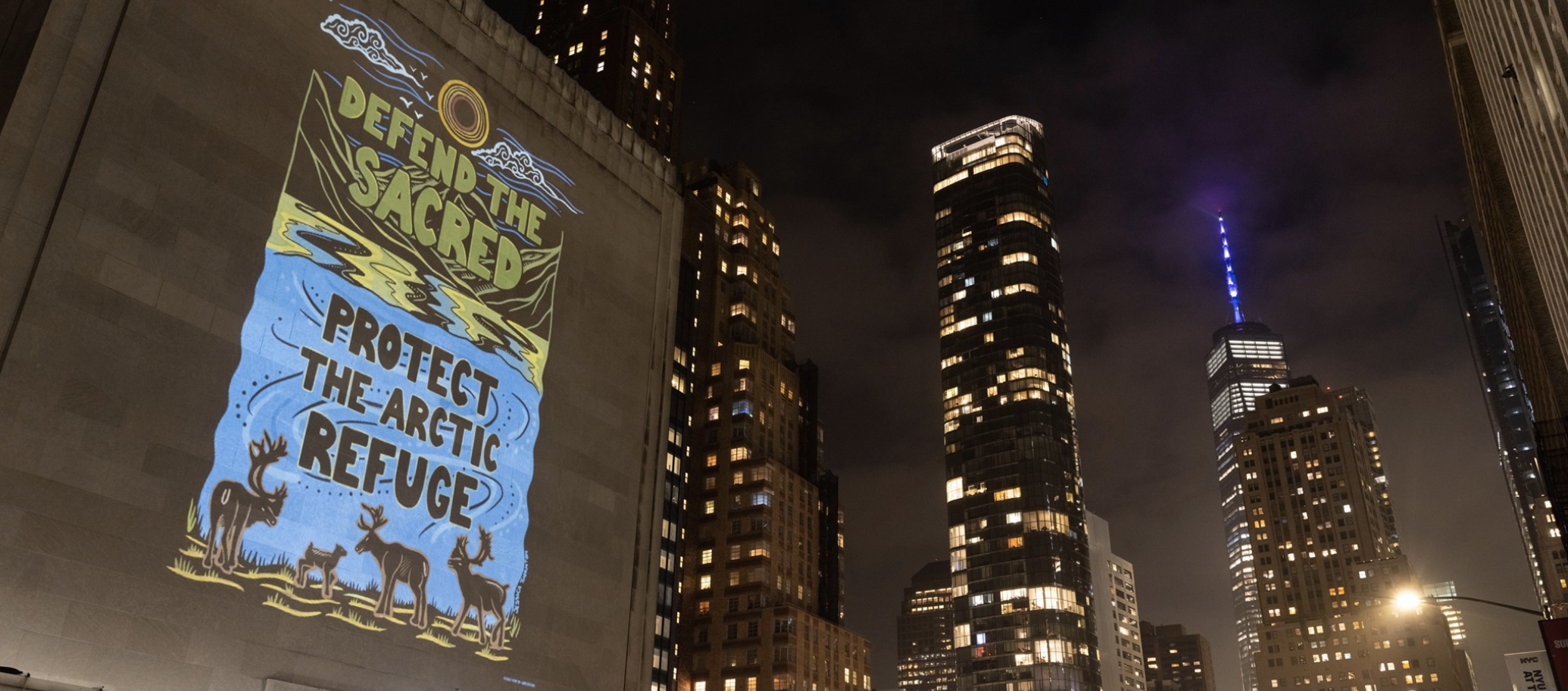
Native Movement Blog
“Defend the Sacred” Public Rally at AFN in Anchorage
Full Live Video • Photos/Video for Media
Updates posted to NativeMovement.org
Charlene Aqpik Apok, Gender Justice Director, introduces speakers from across Alaska for the Defend the Sacred Rally
Anchorage, AK – A large crowd gathered and rallied outside the Annual Alaska Federation of Natives (AFN) convention Thursday afternoon around a large hand-painted banner that read “Defend the Sacred: Extraction is NOT our way of life”. The rally was organized by a coalition of Alaska Native groups to connect the growing crisis of environmental and community health impacts of the extraction industry on Indigenous communities around the State. Host organizations included, United Tribes of Bristol Bay, Mother Kuskokwim, Native Movement and Grandmothers Growing Goodness.
“The Willow Project will impact our future generations. Everyone has a right to protect their health and safety. Everyday, I worry that toxic emissions around us are ruining our health. Is that 1.7 million pounds contributing to my community's neurological disorders? Oil and gas extraction is not the answer.” - Former Mayor of Nuiqsut, Rosemary Ahtuangaruak
As more people exited the conference at the Dena’ina Center many circled and cheered around the rally organizers and speakers with more posters and painted cut-outs of caribou and salmon. April Lynn Monroe, Evansville Tribal Member, took to the microphone to call attention to the Ambler Road Project which has a 60-Day public comment period with the Bureau of Land Management starting Friday, October 20th.
“42 tribes from the Interior of Alaska have a standing resolution against the Ambler Road, if this road happens we would be paying for corporations to contaminate Alaskan lands and leave Alaskans without a sustainable source of food.” - April Lynn Monroe, Evansville Tribal Member.
The theme of the AFN Annual Convention this year is “Our ways of life”, which many of the rally signs and speakers spoke to when highlighting how critical their relationship to the land is for hunting, fishing, and food sharing with their communities.
“The people in my hometown of Nome are very worried about the effect of large scale mining. Senators Murkowski + Sullivan, and even my own Native Corporation are buying into the false solution of critical minerals in a sacred place, the Kigluaik Mountains. Kigluaik means ‘wind that comes from everywhere’. We WILL defend the sacred. Our government is giving U.S. taxpayer dollars to foreign mining company to extract resources. A foreign mining company is going to get a free road to resources. A foreign mining company is going to get a free deep water port. It’s very clear that mine can not stand on it’s own. It’s investors need taxpayer support, but we should not give that support to them.” - Austin Ahmasuk, Environmental Justice Co-Director at Native Movement
The closing speech was given by Allanah Hurley, Executive Director of United Tribes of Bristol Bay, a Tribal consortium working to protect the traditional Yup'ik, Dena'ina, and Alutiiq ways of life in Southwest Alaska, an Instrumental force in decades long fight with the Pebble Mine.
“For the first time in 20 years our people were able to sleep a little more soundly when in January the EPA finalized protections that stopped the Pebble Mine. That would not have happened without people like you, standing in the cold, waving signs, and standing with us. And we stand here today with YOU. The only way we are going to be able to protect our way of life, and our people, is TOGETHER.”
Unfortunately we are also here to say the governor is doing everything in his power to overturn those protections and there are still over 20 more active mining claims in our region, as the state continues to try and turn our home into a toxic mining district. We are here to say, hell no. We will not rest until our grandkids don’t have to carry this burden the same way that we have.” - Allanah Hurley, Dillingham, United Tribes of Bristol Bay
For years communities have been speaking their concerns over the extraction industry and the harm that it perpetuates on Alaskan land, water and air. As Indigenous people, we have always known that the world is interconnected and that when you take from the land or water, you pay for it in other ways. Today, we are seeing that cost, with the loss of the salmon on the Yukon River, the decline of the caribou herd populations and the scarcity of the moose, all of these issues are in part caused by either extractive development or climate change caused by extractive development.
###
Gath & K'iyh: Listen to Heal with cellist Yo-Yo-Ma
Alaskan Healing and Arts Program Brings in Major Star-Power to Shed Light on Pressing Climate Issues
Local youth and Elders gathered with artists, including cellist Yo-Yo Ma, to acknowledge climate impacts to salmon and birch
On Labor Day, an intimate group of about 100 local climate activists, artists, and Indigenous leaders gathered at the UAF president’s house to witness the culminating presentation from this summer’s dynamic Gath & K’iyh: Listen to Heal workshop program in partnership with Yo-Yo Ma’s Our Common Nature, which explores how culture helps us connect to the natural world. This final event brought in some major players to draw attention to climate impacts to local ecosystems, including world-renowned cellist Yo-Yo Ma, drag queen and environmental advocate Pattie Gonia, and singer-songwriter Quinn Christopherson. The event included original music performed with Yo-Yo Ma and workshop participants, written collaboratively with composers Eli Wasserman and Mato Wayuhi (composer for the hit series Reservation Dogs), with an original poem read by Princess Daazhraii Johnson. Pattie Gonia and Christopherson premiered their new climate anthem “Won’t Give Up (Glacier)” with Yo-Yo Ma.
This event was the final event in a series of workshops throughout the summer organized by Native Movement, Fairbanks Climate Action Coalition, Association of Interior Native Educators, and the UAF Climate Scholars program. It aimed to use “Listening to Heal” as a framework to understand the experiences of the Gath and K’iyh* due to climate impacts, address climate grief, and come to a place of hope and action. The group undertook these goals through diverse means, including multiple artistic mediums (such as birch bark and tanned salmon skin), traditional stories from Indigenous Elders, research from UAF climate scientists, experiential exercises, musical exploration, and personal reflections from participants. The group of participants consisted of mostly young people, both Indigenous and non-Indigenous, aged 18-35.
Says Native Movement board member Princess Daazhraii Johnson, “At this time of great suffering for us and our Mother Earth due to the current climate crisis, these workshops allowed us to collectively express our grief, but also to actively nurture our relationship with the salmon and birch. In so doing, we have renewed and reinvigorated our commitment to protect them as relatives.”
Throughout the final weekend, the participants and organizers collaborated with other Alaskan Indigenous leaders to formulate a “Declaration for Gath & K’iyh,” which documents the impacts these species are experiencing, and states the action needed. This declaration will be presented at New York Climate Week.
“The climate crisis cannot be solved with technical fixes and policy solutions alone. The Declaration for Gath & K’iyh offers resolutions to heal our relationships with the Earth, because Indigenous values of kinship and sacredness can lead us toward a brighter future,” says Native Movement’s Climate Justice Director, Michaela Stith.
More information about the project can be found here.
*Gath is King Salmon and K’iyh is Birch in Benhti Kokhut’ana Kenaga dialect
Media Contacts:
Michaela Stith, Native Movement, michaela@nativemovement.org
Aurora Bowers, Fairbanks Climate Action Coalition - aurora@fbxclimateaction.org
Eleanor Guthrie, Climate Scholars Program, emguthrie2@alaska.edu
Mother Kuskokwim Tribal Coalition Stands with Tribes to Stop Donlin Gold
Mother Kuskokwim Tribal Coalition Stands with Tribes that Filed Lawsuit to Stop Donlin Gold
Tribal leaders cite lack of climate analysis, incomplete human health impacts study, fisheries collapse and inadequate Tribal consultation as basis for appeal.
MAMTERILLEQ, ALASKA – The Mother Kuskokwim Tribal Coalition applauded today’s filing of a federal lawsuit by three Yukon-Kuskokwim Delta tribes that seeks to fix critical flaws in the environmental review process used to support the U.S. Army Corps of Engineers’ 2018 wetlands (404) permit for the proposed Donlin open-pit gold mine. If developed, Donlin, located in the headwaters of the Kuskokwim River system, would be the largest open pit gold mine in North America.
“As Tribal nations we have been calling on the Army Corps to put in place the protections that we know the majority of Yukon-Kuskokwim residents want, and to protect our ways of life by rejecting this ill-conceived, outdated mine proposal,” said Anaan’arar Sophie Swope, Director of the Mother Kuskokwim Tribal Coalition. “The Army Corps environmental impact statement process lacked climate analysis, relied on an incomplete human health impacts study, did not take into account the now occurring fisheries collapse in the Kuskokwim River, and contained wholly inadequate Tribal consultation. Under the law, inadequate consultation alone should compel the Corps to conduct a new analysis.”
The legal challenge seeks to overturn the Final Environmental Impact Statement for the mine and the 2018 joint record of decision approving the project signed by the U.S. Army Corps of Engineers, the Bureau of Land Management (BLM), and the U.S. Department of the Interior.
“Everyone who depends on our YK Delta food resources need to fully understand the risks of this mine and I’m grateful that more tribes are joining the fight. Barrick Gold’s history around the world makes clear they care little about environmental impacts and the people who live where they mine. I encourage all tribes to do their own research,” said Beverly Hoffman, a founder of the Mother Kuskokwim Coalition. “Our Mother Kuskokwim Tribal Coalition is committed to defending our way of life — which means fighting the placement of the largest open mine in the world along our river. Too often, human error in large extraction projects causing irreversible harm to the land, water and air. The Kuskokwim River is far too important to our ways of life to allow that to happen.”
Specifically, Tribes are asking that the federal agencies be required to study impacts to downstream waters and villages from a potentially catastrophic tailings dam failure, which the agencies refused to do in the Environmental Impact Statement despite multiple requests from downstream communities. The Tribes also want federal agencies to consider and prevent predicted impacts to Kuskokwim River rainbow smelt. Propeller wash from Donlin’s barges could kill or injure rainbow smelt, which are an important subsistence food source for people in the region and are a key prey species for salmon. Finally, the Tribes are asking the court to require the federal agencies to address serious human health concerns identified by the Alaska Department of Health but ignored in the Environmental Impact Statement.
This is the first federal lawsuit filed against the mine.
Background
The Donlin Gold project is expected to extract 556 million tons of ore to produce about 30 million ounces of gold over the 27-year life of the mine – and would generate 2.5 billion tons of waste rock, some of which would generate acid drainage. The waste rock pile would be up to 1,115 feet tall and would span 2,500 acres, some of which is currently important salmon habitat.
The full list of Tribes formally opposed to Donlin Gold by adoption of resolution includes: Orutsararmiut Native Council, Native Village of Eek, Kasigluk Traditional Council, Native Village of Kwigillingok, Chuloonawick Native Village, Native Village of Kongiganak, Native Village of Tununak, Chevak Native Village, Native Village of Napakiak, Chefornak Traditional Council, Nightmute Traditional Council, Native Village of Nunapitchuk, Kwinhagak Tribal Council, Tuluksak Tribal Council, Organized Village of Kwethluk, Aniak Traditional Council
More information can be found at www.nodonlingold.org
Contact
Sophie Swope, Director of Mother Kuskokwim Tribal Coalition: 907.545.4764
Mother Kuskowim Tribal Coalition is a Community Affiliate of Native Movement
###
Despite local outcry, state sells Nenana land to highest bidders
NENANA, ALASKA, October 20 – The State of Alaska opened the sealed bids yesterday and announced the outcome of the Nenana-Totchaket land sale: 160 bids were received on 24 of the 27 parcels. This sale moves to privatize public land despite concerns raised by local residents. Numerous statewide entities joined local Nenana and Native leadership in asking that Alaska Department of Natural Resources pause the Nenana-Totchaket land sale until appropriate analysis and Tribal consultations can be completed.
“The land sale - if we do get a parcel, it’ll be bittersweet. That means the sale went through – which, we didn’t want it to. We didn’t think the land sale was viable – environmentally, technically, or economically. It’s bittersweet because it means other people are coming into our lands.” said Nenana resident and Alaska Native community leader, Eva Dawn Burk, when asked about the sale before the auction.
Burk is the director of the Tlaa Deneldel Community Group, a Nenana-based community group focused on food sovereignty and cultural revitalization. Tlaa Deneldel is administratively supported by Native Movement, a state-wide non-profit organization. Native Movement placed bids in the auction on behalf of Tlaa Deneldel Community Group in an effort to protect ancestral lands. The group was able to crowd-source funding from donors throughout Alaska in order to bid. Native Movement was announced as the winning bidder on two parcels, while also losing the bid on other parcels.
“The vision for the Tlaa Deneldel Community Group is to help, not just my own village, but other villages as well, to develop land use or land management plans. I like to call them land relationship plans. The goal is to show other tribal entities that we can train our young people on how to get back to traditional use areas and regain skills that are still useful today,”said Burk. “[Engaging in this auction] gives us an opportunity to show other tribes what food sovereignty means in the future. We’re just at those crossroads right now, and I’m really fortunate to be Alaska Native. We have the last wild king salmon runs in the world and I'm gonna keep fighting for the fish.”
Ultimately, Burk says “What’s so disturbing is the amount of money being spent without foresight… This environment isn’t meant for that type of agriculture. Industrial agriculture will ultimately destroy this environment.”
###
Native Movement
Native Movement supports grassroots-led projects that align with our vision, that dismantle oppressive systems for all, and that endeavor to ensure social justice, Indigenous Peoples’ rights, and the rights of Mother Earth. Native Movement is dedicated to building people power, rooted in an Indigenized worldview, toward healthy, sustainable, & just communities for ALL.
Contact:
Lindsey Mailard, lindsey@nativemovement.org 907-987-6567
Enei Begaye Peter, enei@nativemovement.org 928-380-6296
Community Demands Pause of Nenana-Tochaket Road Development
Nenana, AK - As the leaves flush yellow on Toghotthele, a group of local Tribal members and land owners gathered inside the Nenana City School gymnasium with less than a week of notice from the Alaska Department of Transportation (DOT) to hear about the proposed Nenana Tolchaket Road expansion. Four tables are lined with plans for a 15 million dollar road project funded by the State of Alaska. The 20 miles of new road would open 140,000 acres of traditional use lands for industrial agricultural production from the Native Village of Nenana on the George Parks Highway to the Kantishna River bordering Denali National Park and Preserve.
Christina Sunnyboy, Chair of Toghotthele Corporation, Caroline Ketzler, 1st Chief of Nenana Native Village and Toghotthele Board Member, and Eva Burk, Vice Chair of the Toghotthele Corporation, Executive Director of Rock Crossing Consulting and Graduate Research Assistant with Alaska Center for Climate Assessment and Policy, spoke in a circle as a small group created their own public forum with the project staff. Burk said, “You are not considering the cumulative impact of this entire project. It’s not just this road and not just this agricultural land sale. On top of it all, our fish are already crashing. The key message is, this is not the time. The land and the waters are telling you. That’s why we are here.” As Burke spoke to the room, others unfurled a large banner decorated with hand-painted blueberries that read ‘No Consent. No Road’.
Christina Sunnyboy spoke next, “ there is not a total ‘in-support’, no one has asked us officially ‘are we with the project?’, but now that comment has reopened, we have a chance to make our voices heard. DOT has contacted us for possible road work, but what it does, It opens up Toghetelle lands, and I don’t believe it’s worth it to our shareholders.”
Community Member, Kathleen Demientieff, Nenana Tribal Council Member, continued in the circle, “ I was born and raised in Nenana. I am subsistence fisher-woman, I am subsistence hunter and trapper, you name it. I am very discouraged by the State of Alaska. Very disrespectful against our tribal members. Even with Josh (Mayor) . We weren’t notified. We would have fought this. And now you have a schedule. I will call my representatives. I’m going to stop it.”
For nearly 3 hours the community exchanged passionate concerns on the rushed public process, unfinished environmental reviews and inadequate consultations with the Nenana Tribal Council from Alaska DOT. The most common message from the group was clearly around the lack of Tribal and community consultation, as well as an aggressive schedule of development on fragile wetland ecosystems that have been stewarded for generations.
First Chief Caroline Ketzler of the Nenana Tribal Council pulled the attention of the circle as she shared her story. “My family fought for their rights to hunt and fish on these lands and they won years ago against the state. Now you guys are opening it up to anyone and everyone. What do you think is going to happen out there? Exactly what happened in the Minto flats. Decimation. That’s exactly what it is. We are losing our animals and our fish right now. All of my life growing up I heard chiefs talking at the potlatches and they would tell me and everyone else in the room that ‘one day our animals will be gone from this land and all you will have is the land itself.’ That’s today. We run the risk of having people from all over in a pristine area that we’ve kept that way for generations. It’s not just you guys pushing a road in there. It’s way more than that. That’s my heart and soul in that country.”
Josh Verhagen, Mayor of the City of Nenana also spoke with the room, “ It’s not like I’m just lock step with everything the State wants to do. I’ve shared my concerns and have some pretty severe concerns with the agricultural project and this project, and some of them they have listened to. I think there is a more effective way to collaborate and it is to share our knowledge and share our resources. To find a way to make this a better situation. ”
As the meeting neared a natural closing, Johnathan Hutchinson, Principal Engineer and Project Manager for DOT, said “ If we can’t present this community with additional information and vice versa and network and share this information, we are not moving forward at all.”
Missing from the DOT delegation was a representative from the Office of History and Archaeology. The assessment of cultural use sites is necessary to upholding free, prior and informed consent under the the United Nations Declaration of Indigenous Peoples. The State plans to begin assessing cultural sites on Monday, September 12th despite the call from stakeholders present at the meeting for a pause in the process. Public comment is open through Sept. 30
Press Contacts:
Eva Burk, Vice Chair of the Toghotthele Corporation •
edburk@alaska.edu, 907-322-7467
Caroline Ketzler, First Chief Nenana Tribal Council •
carolinejketzler@gmail.com, 907-371-5277
Brandon Hill, Native Movement Communications Co-Director • brandon@nativemovement.org, 207-632-0861


